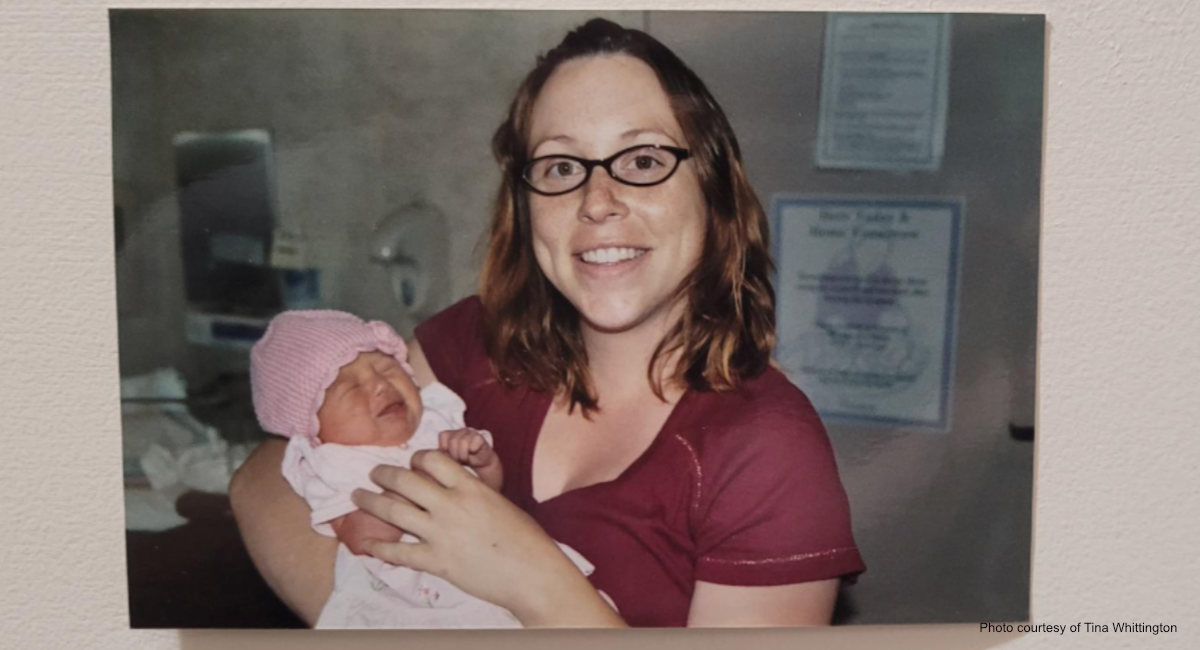Raised in a secular, ‘pro-choice’ home, Tina Whittington came to faith in Jesus Christ in middle school. At 16, she became a pro-life advocate after seeing a presentation about abortion given by a youth pastor. She would one day rely on those pro-life convictions when faced with an unexpected crisis during a pregnancy.
Whittington told Live Action News, “After hearing that speech from the pastor, I referred to Scriptures and understood that God ordained human life as inherently valuable, regardless of the circumstances of one’s birth.”
Given her family’s pro-abortion proclivity, it’s not surprising there were heated discussions around the topic of abortion. When a teenage boy was featured on the local news standing outside high schools holding signs depicting graphic portraits of aborted babies, it caused an uproar in Whittington’s house.
“My parents obviously didn’t approve of what he was doing,” Whittington said. “The kicker was that I had a date planned with this boy and had to tell my parents he’d soon be showing up at our door.”
The couple’s first romantic excursion was spent praying in front of an abortion facility.
Whittington said, “Interestingly, we ended up marrying and my dad eventually became pro-life.”
Pressured to abort
Years later, Whittington was expecting her fourth child, her first daughter. She had the same obstetrician that she had for the three previous pregnancies. Her pregnancy was progressing normally – or so she thought. Then she went for her 20-week ultrasound.
“The ultrasound technician whom I got to know was pro-life,” Whittington said. “She wore a little label pin with baby footprints. During the ultrasound, she got quiet, which was unusual. She just told me that the doctor would come in to talk to me. I knew something was wrong.”
The doctor told Whittington that her baby showed two of the three “soft” markers they look for to identify Down syndrome.
Whittington said, “She had a spot on her heart and one on her head. The doctor wanted me to schedule an amniocentesis to confirm the Down syndrome diagnosis. I refused the amniocentesis because I didn’t have a need to know. I was going to give my daughter life regardless.”
Additionally, Whittington was concerned about the complications — like miscarriage or infection — that could occur because of an invasive procedure. When she refused to have the amniocentesis, her doctor segregated her from her husband, telling her she needed to sign papers rejecting the amniocentesis.
Whittington said, “I understand medical professionals want to protect themselves from frivolous lawsuits and may want to ensure I’m not being influenced by my husband, but I felt it was a blatant attempt to get me in a vulnerable situation.”
In the room, her doctor and midwife told her they just wanted to have an “honest conversation” with her in the name of transparency.
“They told me that under Virginia law, I only had two weeks left to have an abortion,” Whittington said. “I was astounded. Even in the face of my refusal to confirm the Down syndrome diagnosis, I was being pressured to terminate my pregnancy.”
When she stood her ground, Whittington’s doctor told her he couldn’t guarantee she’d have a healthy baby. Whittington responded, “You’re not God, so you can’t guarantee anything.”
Women need support when they choose life
Sharing her experience on social media, Whittington was stunned at how many women came forward, telling of their encounters with medical professionals seemingly eager to convince women to end their pregnancies when Down syndrome was suspected or confirmed.
“I really feel that had I been a single woman, I could have easily been coerced into aborting my child,” Whittington said.
Perhaps what saddened Whittington the most was that she wasn’t offered any assistance or resources to help mothers who chose life for their babies with Down syndrome.
“It was as if they were washing their hands,” Whittington said. “They couldn’t be bothered to discuss with me what to expect should she have Down syndrome and how I could effectively care for this child.”
For the next 18 weeks, Whittington prepared to meet her daughter. She scoured the Internet on her own, seeking information on Down syndrome. “I prayed for my baby’s health, but wanted to be ready in case,” Whittington said. “It was like I was merging faith with reality.”
But her daughter, Esther, was born without any disability.
“When the person in authority that you have given trust for your health, suggests abortion, it carries some weight,” Whittington said. “I was disappointed to be put in that position. At 20 weeks, you’re visibly pregnant and you can feel the movements of your baby. I could have aborted a perfectly healthy baby.”
Further, Whittington says that for most women, the trauma caused by abortion is soul wrenching.
“You’re already imagining a life with your baby at this point. It’s so harmful to suggest that abortion is the only option to women who are depending on their doctors to steer them in the right direction,” Whittington said. “Women need to be supported when they choose life, regardless of any diagnosis.”
She added, “You never regret choosing life for your child. I recall the quote on the office door of the well-known pro-life warrior Jim Sedlak, founder of STOPP: ‘When we need a miracle, God sends a baby,’ and I think about what a treasure life is.”







